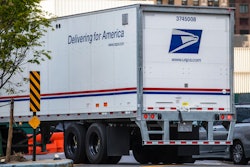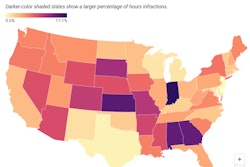Trucking news and briefs for Tuesday, May 14, 2024:
Diesel prices near 2024 low as spot rates dip heading into Roadcheck week
Diesel fuel prices are on a five-week slide and fell near a 2024 low point during the week ending May 13, based on Energy Information Administration data, but spot market freight rates also fell during the same week.
The U.S.’ average for a gallon of on-highway diesel slid 4.6 cents last week, falling to a national average of $3.85 a gallon. That’s the lowest average since the week ending Jan. 22, when diesel prices sat at $3.83 a gallon.
Prices were down in all but one region across the country during the most recent week, with the Rocky Mountain region seeing prices up by just six-tenths of a cent.
The biggest declines during the week were seen in the Gulf Coast and Central Atlantic regions, where prices fell by 5.8 cents and 5.3 cents, respectively.
California holds the nation’s most expensive diesel at $5.12 per gallon, followed by New England at $4.23 per gallon.
The cheapest fuel is available in the Gulf Coast region at $3.56 per gallon, followed by the Midwest region at $3.77 per gallon.
Prices in other regions, according to EIA:
- Central Atlantic -- $4.16
- Lower Atlantic -- $3.79
- Rocky Mountain -- $3.79
- West Coast less California -- $4.05
Rates on the spot market followed fuel down heading into the Commercial Vehicle Safety Alliance’s International Roadcheck inspection blitz now ongoing through Thursday. During the week ending May 10, spot rates were down across the dry van, reefer and flatbed segments, but FTR and the Truckstop load board noted those declines were on par with the same week a year ago, and a sharp increase in rates is expected as a result of Roadcheck, as usual.

 According to the weekly report from FTR Transportation Intelligence and the Truckstop load board, broker-posted spot rates in the Truckstop system declined just over 1 cent after holding basically flat during the prior week. Rates were nearly 4% below the same 2023 week and almost 6% below the five-year average for the week. Rates presumably will rise significantly during the current week. Roadcheck week in both 2022 and 2023 saw rates rise about 7 cents week over week. Meanwhile, total load activity increased 2.4% last week after rising about 4% during the previous week. Total volume was 3.6% above the same 2023 week but more than 30% below the five-year average for the week.
According to the weekly report from FTR Transportation Intelligence and the Truckstop load board, broker-posted spot rates in the Truckstop system declined just over 1 cent after holding basically flat during the prior week. Rates were nearly 4% below the same 2023 week and almost 6% below the five-year average for the week. Rates presumably will rise significantly during the current week. Roadcheck week in both 2022 and 2023 saw rates rise about 7 cents week over week. Meanwhile, total load activity increased 2.4% last week after rising about 4% during the previous week. Total volume was 3.6% above the same 2023 week but more than 30% below the five-year average for the week.
ProMiles’ diesel averages during the same week showed prices fall 4.2 cents to $3.89 a gallon.
According to the ProMiles Fuel Surcharge Index, the most expensive diesel can be found in California at $5.23 per gallon, and the cheapest can be found in the Gulf Coast region at $3.58 per gallon.
[Related: Efficiency or die? In this tough market, 10 mpg never looked so good]
Senate passes bill to extend federal diesel emissions reduction funding program
The U.S. Senate re-authorized the Diesel Emissions Reduction Act (DERA), a federal grants and rebate program that helps finance voluntary replacements or retrofits of heavy-duty diesel trucks and engines, renewing the program through fiscal year 2029 at $100 million annually. The bill will now move to the U.S. House for a vote.
The DERA program was created in 2005 and generally targets older, dirtier diesel engines that lack modern emission control systems to be upgraded with new technologies, such as vehicle and/or engine replacements with new diesel, alternative fuel, and zero emission engines or idle reduction technologies.
While private entities cannot apply for DERA funding directly through the EPA, the agency encourages private fleet owners to partner with eligible entities, including regional, state and local agencies; port authorities; and more, who can receive DERA funds for their own diesel emissions reduction programs.
Over the last nearly two decades, DERA is responsible for saving more than 520 million gallons of fuel and slashing vehicle emission levels, the Environmental Protection Agency reported to Congress in 2022. According to the American Trucking Associations, 60 modern clean diesel trucks emit what just one truck did in 1988, and a newly manufactured truck produces half the CO2 emissions of one manufactured in 2010.
DERA has funded projects in diverse sectors and project locations, but in its 2022 report to Congress, the EPA noted that the largest number of upgrades (43%) went to school buses from 2008 to 2018. Freight sector projects, at 36%, are comprised of various vehicles, including more than 17,000 long-haul combination truck upgrades. Construction, port, municipal, other (industrial, mining, rail yard, and stationary), agriculture, airport, and transit account for the remaining 21% of funded sector upgrades.
Since the inception of DERA, EPA said funding request amounts have exceeded funding availability. In fiscal years 2017 and 2018, grant and rebate applications requested $170 million more in funds than available from DERA appropriations.
[Related: States look to derail CARB, EPA emissions mandates aimed at zero]
OOIDA opens Truckers for Troops campaign
The Owner-Operator Independent Drivers Association is acknowledging Military Appreciation Month with a two-week Truckers for Troops campaign, May 6-19. The campaign focuses on supporting U.S. troops overseas and veterans at home.
OOIDA has held the fund-raising effort since 2007, originally dedicated to sending care packages to service personnel stationed in combat zones. Truckers for Troops has also helped a variety of veterans facilities, including those assisting or housing wounded, disabled or homeless service members.
Over the past 17 years, OOIDA has raised more than $800,000, sent more than 3,273 care packages, serving more than 39,276 members of the military. Aid packages have also been sent to 65 different facilities caring for wounded, disabled and homeless veterans, including the Veterans Community Project. The VCP began in Kansas City and plans to have locations in every state.
During the two-week campaign period, truckers can join OOIDA or renew their membership for $35, with 10% of that money going toward care packages. OOIDA matches the 10% dollar for dollar. Drivers can call OOIDA at (816) 229-5791 during business hours, mention Truckers for Troops, and get transferred to Membership, or join or renew online.
Direct donations to Truckers for Troops are also available.
Anyone who has a family member or friend serving with the U.S. military, and who would like for them to get a care package, can send the name and complete address to [email protected] and be sure to include projected stateside return date.










